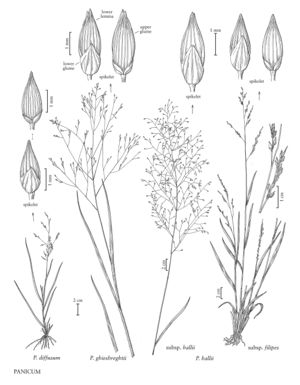familyPoaceae
subfamilyPoaceae subfam. Panicoideae
genusPanicum
subgenusPanicum subg. Panicum
sectionPanicum sect. Panicum
speciesPanicum hallii
subspeciesPanicum hallii subsp. filipes
Difference between revisions of "Panicum hallii subsp. filipes"
Synonyms: Panicum filipes
Treatment appears in FNA Volume 25. Treatment on page 467.
imported>Volume Importer |
imported>Volume Importer |
||
| Line 40: | Line 40: | ||
|publication year= | |publication year= | ||
|special status= | |special status= | ||
| − | |source xml=https:// | + | |source xml=https://bitbucket.org/aafc-mbb/fna-data-curation/src/2e0870ddd59836b60bcf96646a41e87ea5a5943a/coarse_grained_fna_xml/V25/V25_1251.xml |
|subfamily=Poaceae subfam. Panicoideae | |subfamily=Poaceae subfam. Panicoideae | ||
|tribe=Poaceae tribe Paniceae | |tribe=Poaceae tribe Paniceae | ||
Revision as of 21:01, 5 November 2020
Plants often taller than subsp. hallii, sparsely pubescent to almost glabrous. Blades relatively lax, ascending to spreading, not strongly clustered basally or curling at maturity. Panicles scarcely exceeding the blades, with more closely spaced spikelets than in subsp. hallii; main branches rarely whorled, more crowded. Spikelets 2.1-3 mm.
Discussion
Panicum hallii subsp. filipes often grows in moist soil. Its range extends from Arizona, Texas, and Louisiana to southern Mexico.
Selected References
None.
Lower Taxa
None.
... more about "Panicum hallii subsp. filipes"
